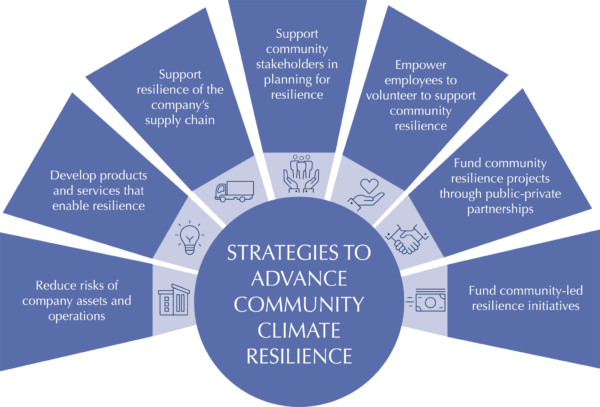As climate impacts worsen in communities around the country, the need for increased resilience is becoming more apparent. Major companies rooted in these communities are uniquely positioned to support community resilience with resources, expertise, and funding. Corporate leaders discussed current efforts underway in a C2ES webinar on the release of our latest publication, An Emerging Blueprint for Companies: Strategies to Advance Local Climate Resilience.
For example, General Motors recently created its Climate Equity Fund. Jessica James, senior manager of the initiative, told the webinar audience how the $50 million investment through 2025 is fulfilling the company’s Equitable Climate Action Principles, which include funding non-profit organizations doing similar work.
“It’s really focused on funding nonprofits that are sitting at the intersection of climate change and equity,” James explained. “Specifically, those at the community level.”
GM is one of more than a dozen companies identified in the C2ES brief that are investing in the resilience of the communities where they operate. The automaker’s philanthropy efforts are expanding access to education and employment opportunities and strengthening city neighborhoods.
“The communities closest to the problem are the communities closest to the solution,” James said.
The fund supports the Eastside Community Network, a public-private partnership that developed the city’s first climate-resilient community center. When it opens in 2023, the solar-powered Lenox Center Resilience Hub on Detroit’s east riverfront, can be a refuge for people in historically underserved eastside neighborhoods during power outages or floods.
The fund also supports a workforce development program run by Elevate, a clean energy and equity-focused nonprofit in the partnership. The program offers training, tools, and mentorship to contractor businesses owned by people of color. This helps them secure clean energy jobs like installing solar panels and energy storage solutions.
Investments like these are critical to improving community resilience to the many hazards communities are facing in the changing climate. In turn, they can have benefits for companies, given the close link between their own resilience and the communities they anchor. When critical public services such as transportation and drinking water systems keep operating during climate-fueled extreme weather events, and homes and communities remain safe, the private sector benefits from business continuity and the increased ability of the broader community to recover quickly.
At the same time, companies are key contributors to economic vitality of the communities where they are rooted, which supports resilience to extreme weather events. Aside from being major employers and providers of critical services and goods, major companies also provide valuable expertise within their communities and among key members of the local supply chain. When these businesses and employees operate most efficiently, they support a thriving local economy that generates tax revenue and contributes to local quality of life.
So how can corporations support local climate resilience?
C2ES has identified seven strategies companies are already practicing to support community climate resilience:
- Reduce risks of company assets and operations.
- Develop climate resilience products and services.
- Support climate resilience of the company’s supply chain.
- Support community stakeholders in planning for climate resilience.
- Empower employees to volunteer to support community climate resilience.
- Fund community climate resilience investments through public-private partnerships.
- Fund community-led climate resilience initiatives.


